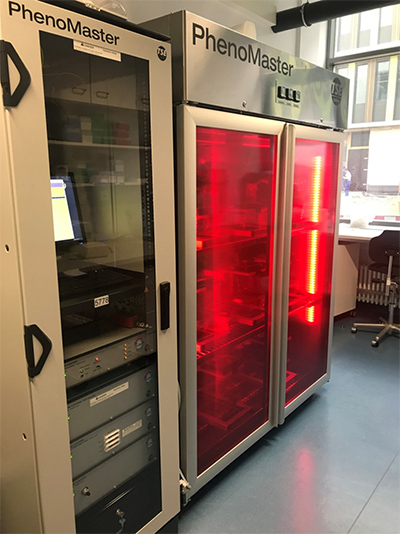A09

In the 1st funding period, project A09 identified several chemokines/chemokine receptors that are differentially regulated in BAT by diet (13% fat vs 60% fat) or housing temperature (23°C vs 4°C), e.g.: Cxcl12, Cxcl10, Ccr10, Cxcl14, Ccl2, Ccl5, Ccl6, Ccl7, Cxcr4 and Cxcr5. Cxcl12 (C-X-C motif chemokine ligand-12) was significantly upregulated in BAT from mice exposed to cold. Upon treatment of mature brown adipocytes with CXCL12, a reduction of Ucp-1 mRNA expression (the major thermogenic marker) was observed. In contrast to Cxcl12, Cxcl10 (C-X-C motif chemokine ligand-10) transcript was downregulated in BAT isolated from mice exposed to cold. Interestingly, Cxcl10 mRNA levels were significantly upregulated in BAT upon HFD diet and in brown adipocytes treated with TNFα to mimic adipose tissue inflammation. Collectively, project A09’s results suggest that Cxcl10 might be a possible macrophage-recruiting factor released by BAT. Further, in project A09 the spatiotemporal organization of cAMP signaling in adipocytes was studied by real-time live cell imaging in pre- and mature brown adipocytes in close collaboration with Prof. Nikolaev (project A06). Cytosolic cAMP microdomains generated during stimulation of individual β-adrenoceptor subtypes (β1, β2 and β3) as well as cAMP degradation by PDEs were visualized revealing PDE3 or 4 differentially regulate cAMP microdomains initiated by β1 or β3 adrenoceptors depending on the stage of adipocytes differentiation (pre- versus mature). Functionally, β1/2 receptor-induced lipolysis was controlled more by PDE3/4 than β3-receptor-induced lipolysis, which might be explained by the changes of both PDE3- and 4-mediated regulation of individual β adrenoceptor-dependent cAMP pools. Project A09 also studies the downstream effectors of cAMP-mediated regulation of BAT, and discovered a so far unknown biological role of the effector receptor EPAC1 in thermogenic fat. Using pharmacological and genetic tools EPAC1 was identified as a potent enhancer of BAT thermogenic capacity that significantly reduces diet-induced obesity and enhances human brown adipocyte differentiation. Thus, EPAC1 is apotentially promising target for obesity prevention and treatment. Also, project A09 studied ADO signaling and found that ADO receptor A2B induces BAT activation and browning of white fat. Human data also revealed that A2BAdoR expression correlates inversely with obesity. Further preliminary data of project A09relate to cAMP signaling organization in murine and human brown/beige adipocytes, the role of A-kinase anchoring proteins for the cAMP signaling architecture, and ADO signaling in adipocyte-macrophage communication.
Prof. Dr. Alexander Pfeifer
E-Mail: alexander.pfeifer©uni-bonn.de
www: Department of Pharmacology and Toxicology, University of Bonn/ Biomedical Center
Prof. Dr Alexander Pfeifer
Selected publications
1. Haas B, Mayer P, Jennissen K, Scholz D, Diaz MB, Bloch W, Herzig S, Fässler R, Pfeifer A. Protein ki-nase G controls brown fat cell differentiation and mitochondrial biogenesis. Sci Signal. 2009 Dec 1;2(99):ra78.
2. Pfeifer A, Hoffmann LS. Brown, Beige, and White: The New Color Code of Fat and Its Pharmacological Implications. Annu Rev Pharmacol Toxicol. 2015 Jan 6;55:207-27.
3. Kannabiran S A, Gosejacob D, Niemann B, Nikolaev V O, Pfeifer A. Real-time monitoring of cAMP in brown adipocytes reveals differential compartmentation of β1 and β3-adrenoceptor signalling. Mol Metab. 2020 Jul 37:100986.
4. Gnad T, Navarro G, Lahesmaa M, Reverte-Salisa L, Copperi F, Cordomi A, Naumann J, Hochhäuser A, Haufs-Brusberg S, Wenzel D, Suhr F, Jespersen NZ, Scheele C, Tsvilovskyy V, Brinkmann C, Rittweger J, Dani C, Kranz M, Deuther-Conrad W, Eltzschig HK, Niemi T, Taittonen M, Brust P, Nuutila P, Pardo L, Fleischmann BK, Blüher M, Franco R, Bloch W, Virtanen KA, Pfeifer A. Adenosine/A2B Receptor Signal-ing Ameliorates the Effects of Aging and Counteracts Obesity. Cell Metab. 2020 Jul 7;32(1):56-70.e7.
5. Gnad T, Scheibler S, von Kugelgen I, Scheele C, Kilic A, Glode A, Hoffmann LS, Reverte-Salisa L, Horn P, Mutlu S, El-Tayeb A, Kranz M, Deuther-Conrad W, Brust P, Lidell ME, Betz MJ, Enerback S, Schrader J, Yegutkin GG, Muller CE, Pfeifer A. Adenosine activates brown adipose tissue and recruits beige adi-pocytes via A2A receptors. Nature. 2014;516(7531):395-399.
6. Klepac K, Yang J, Hildebrand S, Pfeifer A. RGS2: A multifunctional signaling hub that balances brown adipose tissue function and differentiation. Mol Metab. 2019;30:173-183.
7. Pfeifer A, Brandon EP, Kootstra N, Gage FH, Verma IM. Delivery of the Cre recombinase by a self-deleting lentiviral vector: efficient gene targeting in vivo. Proceedings of the National Academy of Sciences of the United States of America. 2001;98(20):11450-11455.
8. Sanyal A, Naumann J, Hoffmann LS, Chabowska-Kita A, Ehrlund A, Schlitzer A, Arner P, Blüher M, Pfeifer A. Interplay between obesity-induced inflammation and cGMP signaling in white adipose tissue. Cell Rep. 2017;18(1):225-236.
9. Mitschke MM, Hoffmann LS, Gnad T, Scholz D, Kruithoff K, Mayer P, Haas B, Sassmann A, Pfeifer A, Kilic A. Increased cGMP promotes healthy expansion and browning of white adipose tissue. FASEB J. 2013 Apr;27(4):1621-30.
10. Niemann B, Haufs-Brusberg S, Puetz L, Feickert M, Jaeckstein MY, Hoffmann A, Zurkovic J, Heine M, Trautmann EM, Müller CE, Tönjes A, Schlein C, Jafari A, Eltzschig HK, Gnad T, Blüher M, Krahmer N, Kovacs P, Heeren J, Pfeifer A. Apoptotic brown adipocytes enhance energy expenditure via extracellular inosine. Nature. 2022 Jul 5. doi: 10.1038/s41586-022-05041-0. Online ahead of print. PMID: 35790189

Prof. Dr. Alexander Pfeifer
Institute of Pharmacology and Toxicology
University Hospital, University of Bonn,

Sana Siddig, PhD
Institute of Pharmacology and Toxicology
University Hospital, University of Bonn

M.Sc. Carolin Möller
Institute of Pharmacology and Toxicology
University Hospital, University of Bonn